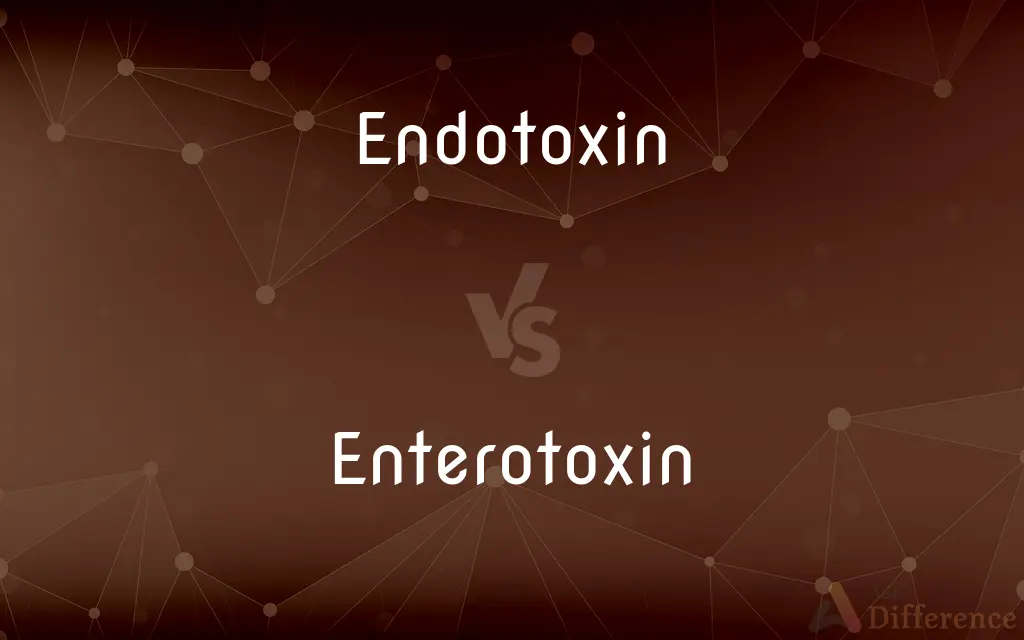Endotoxin vs. Enterotoxin — What's the Difference?
By Tayyaba Rehman & Maham Liaqat — Updated on April 18, 2024
Endotoxins are stable, heat-resistant toxins associated with the outer membrane of certain bacteria, while enterotoxins, which are heat-labile, specifically target the intestines.

Difference Between Endotoxin and Enterotoxin
Table of Contents
ADVERTISEMENT
Key Differences
Endotoxins are lipopolysaccharides found in the outer membrane of Gram-negative bacteria and are released when the bacteria die. Whereas, enterotoxins are proteins produced by both Gram-positive and Gram-negative bacteria and are actively secreted during bacterial growth.
Endotoxins cause a wide range of symptoms, primarily fever and shock, due to their ability to provoke systemic inflammation. On the other hand, enterotoxins primarily cause gastrointestinal symptoms like vomiting and diarrhea, as they directly affect the intestinal mucosa.
Unlike enterotoxins which can be variously heat-labile or heat-stable depending on their structure, endotoxins are generally heat-stable, resisting temperatures up to 250°C. Enterotoxins, however, often lose their activity when heated above 60°C for a period.
Endotoxins are less specific in their mechanism of action, broadly stimulating the immune system through a common pathway involving Toll-like receptors. Conversely, enterotoxins have specific modes of action on host cells, often disrupting normal cellular functions through different pathways like cAMP.
Comparison Chart
Chemical Nature
Lipopolysaccharide
Protein
ADVERTISEMENT
Stability
Heat-stable (up to 250°C)
Usually heat-labile (degrades above 60°C)
Source Bacteria
Gram-negative bacteria
Both Gram-positive and Gram-negative bacteria
Primary Effects
Fever, shock
Vomiting, diarrhea
Target in Host
General immune response
Intestinal mucosa
Compare with Definitions
Endotoxin
A toxin associated with the outer membrane of Gram-negative bacteria.
Limulus amebocyte lysate test detects endotoxin in medical applications.
Enterotoxin
A toxin targeting the gastrointestinal tract.
Staphylococcal enterotoxins cause food poisoning.
Endotoxin
Induces systemic inflammation.
Endotoxin can trigger septic shock in severe infections.
Enterotoxin
Produced by bacteria during growth.
Some enterotoxins are secreted as bacteria multiply in contaminated food.
Endotoxin
Detected through the pyrogen test.
Intravenous drugs must be tested for endotoxin to ensure safety.
Enterotoxin
Causes symptoms like diarrhea and vomiting.
Enterotoxin exposure often results in rapid onset of gastrointestinal distress.
Endotoxin
Highly heat-stable.
Endotoxin remains active even after boiling.
Enterotoxin
Can be either heat-labile or heat-stable.
Heat-labile enterotoxins are inactivated by cooking.
Endotoxin
Released upon bacterial cell death.
Antibiotic treatment can cause endotoxin release by killing bacteria.
Enterotoxin
Specifically disrupts intestinal cell function.
Cholera toxin, an enterotoxin, disrupts electrolyte balance in intestinal cells.
Endotoxin
A toxin produced by certain bacteria and released upon destruction of the bacterial cell.
Enterotoxin
An enterotoxin is a protein exotoxin released by a microorganism that targets the intestines.Enterotoxins are chromosomally encoded or plasmid encoded exotoxins that are produced and secreted from several bacterial organisms. They are heat labile (>60⁰), and are of low molecular weight and water-soluble.
Endotoxin
Any toxin secreted by a microorganism and released into the surrounding environment only when it dies.
Enterotoxin
A toxin produced by bacteria that is specific for intestinal cells and causes the vomiting and diarrhea associated with food poisoning.
Endotoxin
A toxin that is confined inside the microorganisms and is released only when the microorganisms are broken down or die
Enterotoxin
(biochemistry) Any of several toxins produced by intestinal bacteria
Enterotoxin
A cytotoxin specific for the cells of the intestinal mucosa
Common Curiosities
What is an enterotoxin?
Enterotoxin is a protein toxin released by bacteria that specifically targets the intestines to cause symptoms like diarrhea and vomiting.
Can both endotoxins and enterotoxins cause fever?
Endotoxins can cause fever and systemic effects, whereas enterotoxins primarily cause gastrointestinal symptoms and rarely cause fever.
How do endotoxins and enterotoxins differ in their stability?
Endotoxins are highly heat-stable and can withstand high temperatures, whereas enterotoxins are generally heat-labile and are inactivated by heat.
Are all enterotoxins produced by Gram-positive bacteria?
No, enterotoxins can be produced by both Gram-positive and Gram-negative bacteria.
How do the effects of enterotoxins differ from those of other toxins?
Enterotoxins specifically target the intestines, unlike other toxins which may have broader or different target areas in the body.
What is an endotoxin?
Endotoxin is a complex lipopolysaccharide found on the outer membrane of Gram-negative bacteria, released when the bacteria die.
How can one prevent the harmful effects of endotoxins?
Preventing infection through proper hygiene and medical practices is key to avoiding the harmful effects of endotoxins.
How do endotoxins affect the immune system?
Endotoxins trigger a broad immune response by stimulating Toll-like receptors, leading to inflammation and sometimes shock.
What are the primary health impacts of enterotoxins?
Enterotoxins mainly affect the gastrointestinal system, causing symptoms such as vomiting and diarrhea.
How are endotoxins released from bacteria?
Endotoxins are released when Gram-negative bacteria die and their cell walls break down.
What measures can be taken to deactivate enterotoxins in food?
Heating food thoroughly can deactivate many heat-labile enterotoxins, reducing the risk of food poisoning.
What safety tests are performed to ensure pharmaceuticals are free from endotoxins?
Pharmaceuticals undergo rigorous safety testing, including the pyrogen test, to ensure they are free from endotoxins.
What is the role of endotoxins in septic shock?
Endotoxins can cause septic shock by inducing a strong and widespread inflammatory response.
What kind of bacteria produce enterotoxins?
Bacteria like Staphylococcus aureus and Escherichia coli are well-known producers of enterotoxins.
Can endotoxin levels be monitored in medical settings?
Yes, endotoxin levels are commonly monitored in clinical settings using tests like the Limulus amebocyte lysate (LAL) test to detect their presence in drugs and fluids.
Share Your Discovery

Previous Comparison
Loyalty vs. Lealty
Next Comparison
Warehouse vs. StockAuthor Spotlight
Written by
Tayyaba RehmanTayyaba Rehman is a distinguished writer, currently serving as a primary contributor to askdifference.com. As a researcher in semantics and etymology, Tayyaba's passion for the complexity of languages and their distinctions has found a perfect home on the platform. Tayyaba delves into the intricacies of language, distinguishing between commonly confused words and phrases, thereby providing clarity for readers worldwide.
Co-written by
Maham Liaqat













































